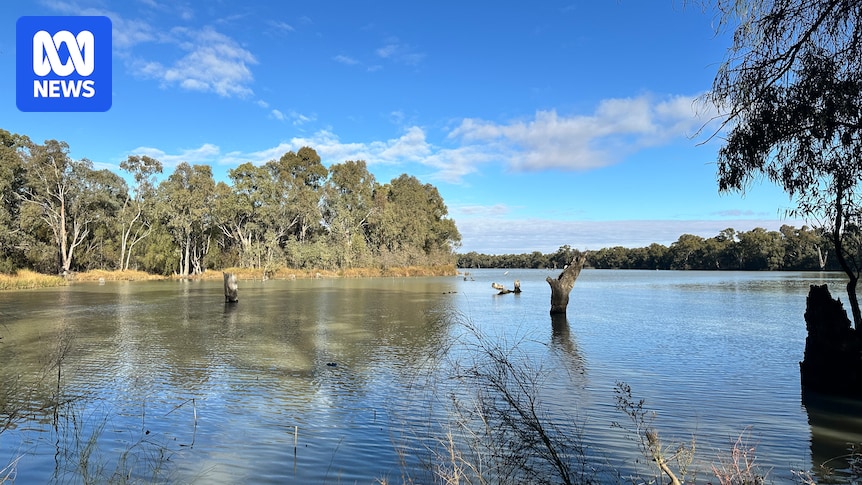For the first time in Victoria, three groups of First Nations people will have the right to control access to designated parts of their country, after the Federal Court awarded a historic native title determination in the state’s north-west.
It means that anyone who is not a traditional owner of the Millewa-Mallee will need to seek permission from them, as the native title holders, to enter those areas of their country.
Kings Billabong Park is part of the Millewa-Mallee peoples’ native title claim. (ABC Mildura-Swan Hill: Tyrone Dalton)
This landmark determination recognises the First Peoples of the Millewa-Mallee’s exclusive possession of certain parcels of land reserved expressly for the benefit of First Nations people.
These areas are mainly where Indigenous corporations already hold title.
Exclusive rights are the strongest form of native title and, until now, have not been recognised in Victoria.
As part of the ruling, the state and traditional owners have agreed to negotiate exclusive access to some parts of Crown land within the claim zone, such as national parks.
However, farms, roads, public spaces and camp grounds, waterways used for recreational fishing and boating, and other locations with existing titles, are exempt from the new ruling.
The Millewa-Mallee native title decision was delivered on Country near Mildura. (ABC News: Tamara Clark)
The National Native Title Tribunal defines determination as a decision by a recognised body, such as the Federal Court or High Court of Australia, that native title either does or does not exist over a particular area.
Three traditional owner groups — Ngintait, Latji Latji and Nyeri Nyeri — make up the First Peoples of the Millewa-Mallee.
On Friday morning, Federal Court Justice Elizabeth Bennett presented the formal determination to claimants and elders at Psyche Bend in Kings Billabong Park near Mildura, in north-west Victoria.
The native title claim stretches from the South Australian border to Kings Billabong Park. (Supplied: First Nations Legal and Research Services)
Popular landmarks
The native title ruling spans thousands of square kilometres of the Mallee between Kings Billabong and Hattah, in the east, and the South Australian border in the west.
Some parcels of land within the overall claim have been awarded exclusive rights status.
The total claim area includes the whole south side of the Murray River between Iraak (about 40km south-east of Mildura) and Lindsay Point in the north-west corner of Victoria (about 130km west of Mildura).
Several popular destinations are covered by the native title determination.
Apex Park Sandbar, Kings Billabong Park and Murray-Sunset National Park, home to Victoria’s famous pink lakes, are all on the list of landmarks covered by the overall native title claim.
Kings Billabong is also home to Bruce’s Bend Marina where houseboats are moored. (ABC Mildura-Swan Hill: Tyrone Dalton)
Exclusive land rights
Typically, native title in Victoria has involved non-exclusive rights.
This means the rights of traditional owners’ laws and customs coexist with other existing or future rights held by others.
The determination announced on Friday leaves Tasmania and the ACT as the only jurisdictions in Australia that do not have any areas of native title with exclusive rights status.
Federal court Justice Elizabeth Bennett handing Aunty Janine Wilson the determination. (ABC News)
Nyeri Nyeri elder Wendy Brabham, who was an early respondent in the native title claim application, is following in the footsteps of her mother.
“My mother’s demands for land rights in the 1970s and, for more than 25 years, our claims for native title suffered, until now, an onslaught of rejections,”
she said.
“Nyeri Nyeri Peoples, with their own ancient, longstanding laws, customs and protocols, have had to listen to, and bend to Australian laws, customs and protocols in a constant battle, in a clash of world views.
“I hope our future generations of all our family groups will build on today’s decision to honour our ancestors by strengthening, preserving and sharing our culture.”
The Psyche Bend Pumps were built in the late 19th century as part of Victoria’s first irrigation settlement near Mildura. (ABC Mildura-Swan Hill: Tyrone Dalton)
After the decision was handed down, she said she had “mixed feelings” on an otherwise uplifting occasion.
“It was always our land,” she said.
“Native title is such a hard process for people to be a part of.
“First Nations, we just need a break, a breakthrough in relation to so many aspects of our community.
Among the applicants were Ngintait man Timothy Johnson, left, with Latji Latji man Shane Jones Snr and Nyeri Nyeri elder Wendy Brabham. (ABC News)
“It’s not just native title … it’s also balancing the human rights issues in this country and being recognised as First Nations people.”
The native title holders’ rights will be managed by the First People of the Millewa-Mallee Aboriginal Corporation, which will serve as the registered native title body corporate.
The Latji Latji, Ngintait and Nyeri Nyeri peoples have been seeking recognition of their native title rights since the 1990s and in 2015 lodged an application for a native title claim with the Federal Court.
The Mallee and Millewa regions in north-west Victoria are home to citrus and grape farms. (ABC Mildura-Swan Hill: Wade Stephens)
Decade-long legal battle
First Nations Legal and Research Services represented the traditional owners throughout the court proceedings.
Its senior lawyer, Stacey Little, said the determination was the result of a decade-long legal battle.
First Nations Legal and Research Services lawyers Stacey Little and Eleanor Kay. (ABC News: Timu King)
“This determination is a testament to their strength and persistence and reinforces their right to be involved in decision-making about country,”
Ms Little said.
Native title is not new to Sunraysia residents who live along the border between New South Wales and Victoria.
In 2015, the Federal Court awarded native title to the Barkandji traditional owners on the north side of the Murray River in New South Wales.
Federal Court documents show the Wamba Wemba traditional owners group, further upstream near Swan Hill, is also applying for native title.
